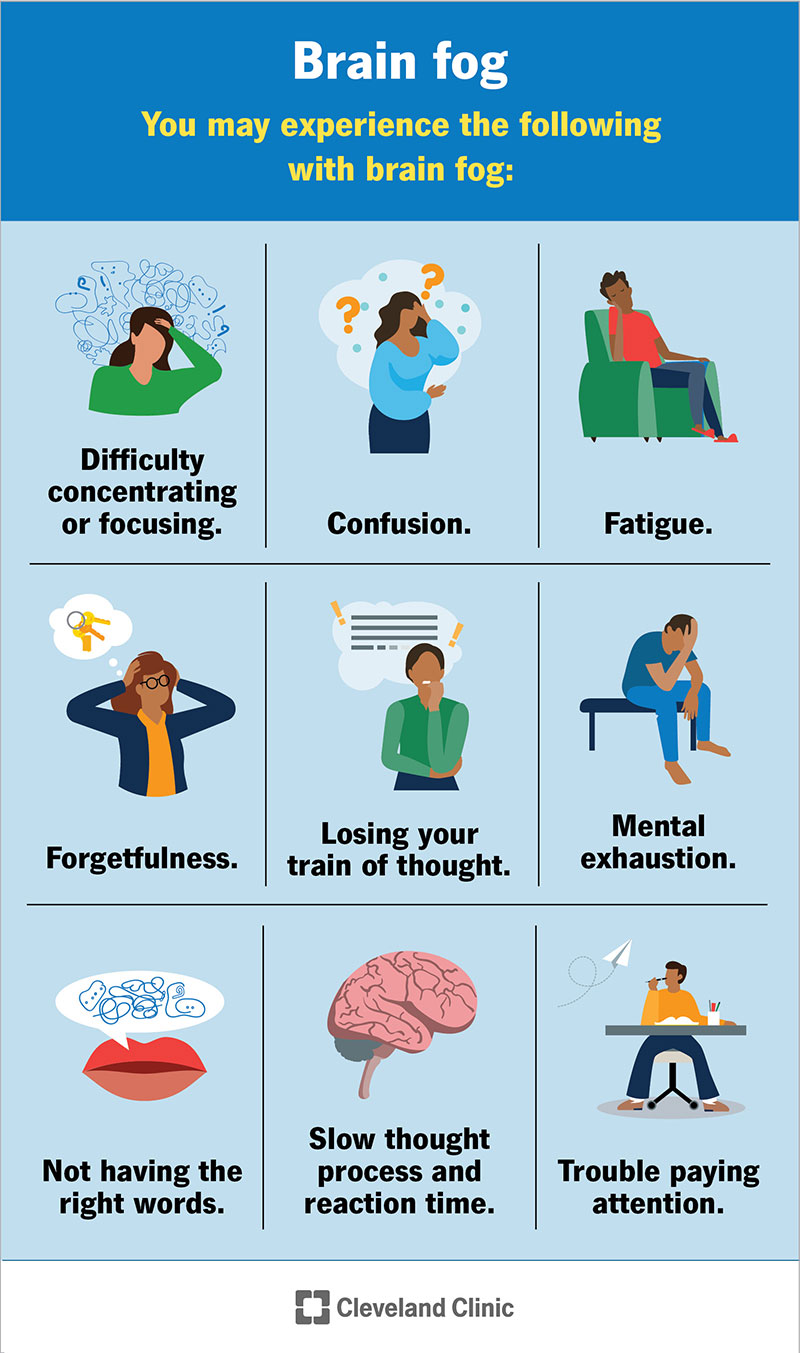Brain fog is a common group of symptoms that affect how you think, remember and concentrate. It can make doing ordinary tasks challenging. You might lose your train of thought in the middle of a conversation. It’s usually temporary, but the length of time you’ll experience brain fog can vary.
Advertisement
Cleveland Clinic is a non-profit academic medical center. Advertising on our site helps support our mission. We do not endorse non-Cleveland Clinic products or services. Policy

Image content: This image is available to view online.
View image online (https://my.clevelandclinic.org/-/scassets/images/org/health/articles/brain-fog)
“Brain fog” is a term for a range of symptoms that cause cognitive impairment. This affects your ability to think clearly, focus, concentrate, remember and pay attention. Like its name, these symptoms cloud your mind and make it difficult to perform routine tasks like holding a conversation, listening to instructions or remembering the steps of something you’re doing.
Advertisement
Cleveland Clinic is a non-profit academic medical center. Advertising on our site helps support our mission. We do not endorse non-Cleveland Clinic products or services. Policy
Brain fog, also called mental fog, can happen after an illness, as a side effect of a medication (like chemotherapy) or as a symptom of an underlying condition. A healthcare provider can help you determine what’s causing brain fog to help you feel more like yourself.
Brain fog can feel slightly different for each person. You may experience the following with brain fog:
There are multiple possible causes of brain fog. Some common causes include:
In addition, you may develop brain fog after:
Some research shows that your immune system could cause inflammation in your brain (neuroinflammation) that temporarily blocks or makes it more difficult for your body to process information.
Advertisement
Regarding brain fog and COVID-19, new research shows that brain fog is a result of the virus living in your gut after infection symptoms resolve. It changes your gut’s microbiome. This can reduce how much serotonin (a chemical messenger) your body produces, which can impact cognitive function and lead to symptoms of brain fog.
There isn’t a specific treatment available for brain fog. A healthcare provider might first recommend tips to boost your immune system like:
If these tips don’t resolve brain fog, a healthcare provider may address specific symptoms with medications like antidepressants or nonsteroidal anti-inflammatory drugs (NSAIDs), among others. Your provider will also discuss any side effects to look out for while you’re taking a new medication.
There isn’t a specific timeframe as to how long you’ll experience brain fog. You might feel it for a few days to weeks. But it could last for months to years in some cases. Contact a healthcare provider if brain fog is interfering with your quality of life. They can help you find treatment options to reduce its impact on you.
You can’t completely prevent brain fog from happening. But you can take steps to improve your mental and physical health to reduce your risk of symptoms becoming bothersome.
As brain fog is common after COVID-19 infections, getting the COVID-19 vaccine is beneficial to reduce your risk.
Let a healthcare provider know if you experience brain fog, especially if it’s disruptive to your daily activities and routine. You might want to talk to a provider if you frequently forget about appointments, have trouble completing ordinary tasks or find it difficult to pay attention when someone’s talking to you. Brain fog is common, and a provider can help you find out what’s causing your symptoms.
If you have brain fog, you might feel frustrated and stuck. Your mind is in a state of buffering, like waiting for a video to load with an unstable internet connection. You know you’re able and willing to complete certain tasks, but you feel like something is holding you back. This can be a tiring and overwhelming feeling, especially if you have a lot of obligations on your plate.
Let a healthcare provider know if brain fog affects your day-to-day life. They’ll be able to diagnose and manage the underlying cause to help you feel better. Your provider may also recommend lifestyle changes, like eating healthy meals and getting better sleep, to improve how your immune system functions.
Advertisement

Sign up for our Health Essentials emails for expert guidance on nutrition, fitness, sleep, skin care and more.
Learn more about the Health Library and our editorial process.
Cleveland Clinic’s health articles are based on evidence-backed information and review by medical professionals to ensure accuracy, reliability and up-to-date clinical standards.
Cleveland Clinic’s health articles are based on evidence-backed information and review by medical professionals to ensure accuracy, reliability and up-to-date clinical standards.
If you have a neurological condition, you want expert advice. At Cleveland Clinic, we’ll work to create a treatment plan that’s right for you.
